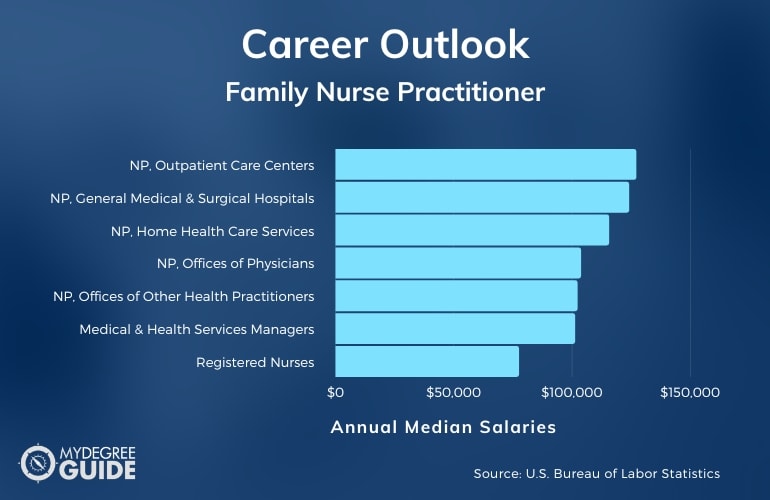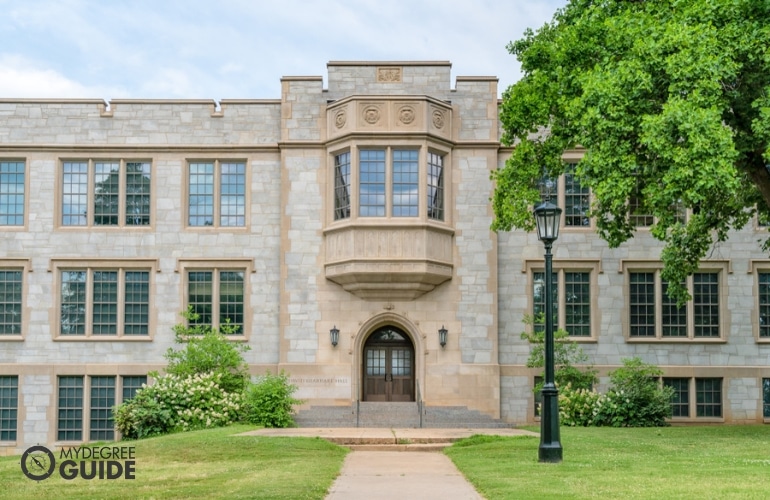Online FNP programs provide a convenient option for taking your nursing career to the next level.

As a family nurse practitioner, you might be qualified to provide more advanced healthcare services, work as a leader in your organization, and earn a higher salary. Family nurse practitioner online programs can be an effective way to get the necessary education for a job in this field.
Editorial Listing ShortCode:
You could graduate ready to pursue licensure and to serve patients of all ages with diagnoses, treatments, and care.
Universities Offering Online MSN in Family Nurse Practitioner Degree Programs
Methodology: The following school list is in alphabetical order. To be included, a college or university must be regionally accredited and offer degree programs online or in a hybrid format.
Arkansas State University
Arkansas State University offers a Family Nurse Practitioner MSN. All coursework is entirely online. To graduate, students must complete 41 credit hours, including practicum and emphasis courses, and 720 clinical hours. There are multiple start dates offered each year, and courses are attended in an accelerated format. Potential courses include Healthcare Issues and Policy.
Arkansas State University is accredited by the Higher Learning Commission.
Bradley University
U.S. News & World Report named Bradley University as one of the Best Regional Universities in the Midwest. The school offers an MSN for Family Nurse Practitioners. The program is fully online with no residency requirements. Students get to choose their preceptors for their clinicals. To graduate, students must complete 50 credit hours and 700 clinical hours.
Bradley University is accredited by the Higher Learning Commission.
Campbellsville University
Campbellsville University is a Christian college offering an MSN with a Family Nurse Practitioner track. Students may take courses entirely online. Students can potentially finish the degree in 2 to 3 years when attending full-time. The program requires the completion of 45 credits and 660 clinical hours. Courses are offered in an 8 week, accelerated format.
Campbellsville University is accredited by the Southern Association of Colleges and Schools Commission on Colleges.
Carlow University
Carlow University offers an MSN with a Family Nurse Practitioner concentration. Students may complete coursework fully online or in a hybrid format with two monthly evening classes on campus. Along with their coursework, students must also complete 600 clinical hours to graduate. The program can potentially be completed in just 2.5 years.
Carlow University is accredited by the Middle States Commission on Higher Education.
Carson-Newman University
Carson-Newman University offers an MSN with a Family Nurse Practitioner track that can potentially be completed in 32 months. Coursework is mostly online, but students are required to participate in a residency that is 3 days long. Along with the required courses, students must complete 600 clinical hours to graduate. Carson-Newman helps students find a placement and a preceptor.
Carson-Newman University is accredited by the Southern Association of Colleges and Schools Commission on Colleges.
Cedarville University
Cedarville University offers a Christian MSN Family Nurse Practitioner program. There are start dates offered in August, January, and May, and students may enroll full-time or part-time. Coursework is mostly online, but there are four on-campus intensives that are 2 to 3 days long required throughout the program. Along with their coursework, students must also complete a 600 hour clinical experience.
Cedarville University is accredited by the Higher Learning Commission.
Chamberlain University
Chamberlain University offers an MSN for Family Nurse Practitioners. Students can complete their coursework entirely online, but there are two required weekend immersion experiences on campus. Students must also complete a local practicum. Chamberlain helps students find a preceptor. The program can potentially be completed in 8 semesters.
Chamberlain University is accredited by the Higher Learning Commission.
Davenport University
Davenport University offers an MSN for Family Nurse Practitioners. The program is available entirely online, and all intensives are virtual. Students can potentially finish the program in just 2 years. Courses are offered three times each year. To graduate, students are required to complete a clinical and a capstone project.
Davenport University is accredited by the Higher Learning Commission.
Drexel University
U.S. News & World Report ranked Drexel University among the best online graduate nursing programs for family nurse practitioner training. Students at Drexel can earn an MSN for Family Nurse Practitioners. While many of the courses are available online, students are required to come to campus several times and participate in virtual intensives.
Drexel University is accredited by the Middle States Commission on Higher Education.
Duquesne University
U.S. News & World Report named Duquesne University one of the best online programs for family nurse practitioner training. Duquesne offers an MSN in Family (Individual Across Lifespan) Nurse Practitioner. Coursework is completed entirely online, but students are required to come to campus twice during the program. There are three start dates offered each year.
Duquesne University is accredited by the Middle States Commission on Higher Education.
Fairleigh Dickinson University
Farleigh Dickinson University offers a Family Nurse Practitioner MSN. The program requires the completion of 37 credits that can be completed online and a 650 hour clinical experience that can be completed locally. Some courses offered are 8 weeks long, while others are 15 to 16 weeks long. Students can potentially complete the program in 3 years.
Fairleigh Dickinson University is accredited by the Middle States Commission on Higher Education.
Franklin University
Franklin University offers an MSN for Family Nurse Practitioners that can be completed fully online. The school is committed to providing students with an affordable education. To graduate, students must complete 41 credit hours and a capstone project, and they may transfer in up to 13 qualifying credits from another accredited school. Potential courses include Advanced Pharmacology and Role of the Master’s Prepared Nurse.
Franklin University is accredited by the Higher Learning Commission.
Georgetown University
Georgetown University offers an MSN for Family Nurse Practitioners. Coursework is online, but students must attend two on-campus objective clinical intensives and complete 650 clinical hours. Online classes are in a live, synchronous format. The program requires the completion of 44 credits and can potentially be finished in just 27 months.
Georgetown University is accredited by the Middle States Commission on Higher Education.
Gonzaga University
Gonzaga University offers an MSN for Family Nurse Practitioners. Students can complete most coursework online but must come to campus for at least six intensives. The program requires the completion 47 credit hours and 660 clinical hours, which can potentially be finished in 9 semesters. Potential courses include Theoretical Foundations for Healthcare Improvement.
Gonzaga University is accredited by the Northwest Commission on Colleges and Universities.
Grand Canyon University
Grand Canyon University offers an MSN for Family Nurse Practitioners. Courses are fully online, but students must attend two on-campus experiences that are 2 to 3 days long. The program requires the completion of 53 credit hours and 675 clinical hours. Most classes are 8 weeks long, but some are 16 weeks long. Students can potentially complete the program in 35 months.
GCU is accredited by the Higher Learning Commission.
Herzing University
Students can earn an MSN for Family Nurse Practitioners degree through Herzing University’s BSN-to-FNP program. U.S. News & World Report named the school one of the best online programs for a graduate degree in nursing. Courses are completed online, but 585 clinical hours are required. The program can potentially be completed in 20 months.
Herzing University is accredited by the Higher Learning Commission.
La Salle University
La Salle University students offers an MSN for Family Nurse Practitioners. The program’s coursework can be completed entirely online. The program requires the completion of 45 credit hours and can potentially be finished in 24 months. There are multiple start dates offered. Students may choose between three concentrations: Gerontology, Primary Care for Women, or Primary Care for Children.
La Salle University is accredited by the Middle States Commission on Higher Education.
Maryville University
Maryville University offers four online programs for students pursuing careers as family nurse practitioners, including an MSN in FNP. The program is offered entirely online. Students don’t have to come to campus and may complete their clinicals locally. To graduate, students must complete 745 clinical hours and 47 credit hours. There are six start dates offered each year.
Maryville University is accredited by the Higher Learning Commission.
Northern Kentucky University
Niche ranked Northern Kentucky University as one of the Best Colleges for Nursing in America. NKU students can earn an MSN for Family Nurse Practitioners. All coursework is online, and courses are 7 weeks long. Students must complete 47 credit hours and 600 clinical hours to graduate. There are several start dates offered throughout the year.
Northern Kentucky University is accredited by the Southern Association of Colleges and Schools Commission on Colleges.
Ohio University
U.S. News & World Report named Ohio University one of the Best Online Programs for Graduate Nursing. The school offers an MSN for Family Nurse Practitioners. Didactic courses are available entirely online. Students must complete 37 credit hours and 500 clinical hours to graduate. The program can potentially be finished in 5 semesters.
Ohio University is accredited by the Higher Learning Commission.
Olivet Nazarene University
Students seeking an MSN for Family Nurse Practitioners may earn their degree through Olivet Nazarene University. The school offers an MSN in FNP that can be earned online. All courses are fully online but do have some synchronous elements. Students must complete 52 credit hours to graduate. Courses are 8 weeks long, and there are four start dates offered each year.
Olivet Nazarene University is accredited by the Higher Learning Commission.
Regis College
Master’s Program Guide listed Regis College as #16 in its list of 50 Best Online MSN Programs. The school offers an MSN for Family Nurse Practitioners. All coursework is available online. The program requires the completion of 46 to 61 credit hours, depending on students’ previous degrees. Students can potentially complete the program in 28 months.
Regis College is accredited by the New England Commission of Higher Education.
Rivier University
Nursing Schools Almanac named Rivier University the Best Nursing School in New Hampshire. Rivier offers an online program for an MSN for Family Nurse Practitioners. Courses are taken online, but students are required to attend some on-campus intensives. Each course is 14 weeks long. The program can potentially be completed in 36 months.
Rivier University is accredited by the New England Commission of Higher Education, Inc.
Sacred Heart University
Sacred Heart University offers an MSN for Family Nurse Practitioners. Students can complete their courses online but must come to campus for three short experiences. Students may complete clinical hours locally. The program requires the completion of 42 credit hours and can potentially be finished in 30 months. The curriculum is designed to prep students for future PCP training.
Sacred Heart University is accredited by the New England Commission of Higher Education.
Simmons University
U.S. News & World Report named Simmons University ninth in Best Online Programs for Family Nurse Practitioners. The school’s MSN in FNP program features fully online classes. Many courses feature flex scheduling and asynchronous coursework. Simmons helps students find clinical locations and preceptors near their homes. There are several start dates offered each year.
Simmons University is accredited by the New England Commission of Higher Education.
South University
South University offers an MSN with a specialization in Family Nurse Practitioner. All coursework is fully online, and many courses feature asynchronous learning. Students must complete 62 credit hours and 650 clinical hours to graduate. The program can potentially be finished in just 24 months. Potential courses include Family Health: Adult and Gerontology.
South University is accredited by the Southern Association of Colleges and Schools Commission on Colleges.
Southern New Hampshire University
Southern New Hampshire University offers an MSN for Family Nurse Practitioners. Coursework is fully online and asynchronous, but students are required to attend one multi-day intensive at the SNHU campus. The program requires the completion of 51 credit hours and 650 clinical hours. Students can potentially finish in just 2 years when taking two courses per term.
Southern New Hampshire University is accredited by the New England Commission of Higher Education, Inc.
St. Thomas University
St. Thomas University offers an MSN for Family Nurse Practitioners. Courses are available online. Students must complete 47 credit hours and a clinical experience to graduate. The program can potentially be finished in just 18 months. Courses are 6 to 7 weeks long. There are six start dates offered each year
St. Thomas University is accredited by the Southern Association of Colleges and Schools Commission on Colleges.
Texas A&M University
Texas A&M University offers an MSN with a Family Nurse Practitioner track. Much of the program can be completed online, but students are required to come to campus several times during the program, including for a 45 hour clinical The school prefers applicants to live in Texas. Students must complete a total of 48 credit hours to graduate.
Texas A&M University is accredited by the Southern Association of Colleges and Schools Commission on Colleges.
University of Cincinnati
The University of Cincinnati offers an MSN for Family Nurse Practitioners. The program is available online, with no site visits required. Students can potentially complete the program in just 2 years. Classes start in the fall, spring, and summer. Students must complete 51 credit hours and 672 clinical hours to graduate.
The University of Cincinnati is accredited by the Higher Learning Commission.
University of Michigan
The University of Michigan offers an MSN for Primary Care Family Nurse Practitioners. Coursework is available online, but students must attend an on-campus orientation and 3 day intensives each term. The program requires the completion of 55 credit hours. Students can potentially finish the program in 2 to 3 years, depending on their course load.
The University of Michigan is accredited by the Higher Learning Commission of North Central Association of Colleges and Schools.
University of Phoenix
The University of Phoenix offers an MSN for Family Nurse Practitioners for students in some states. The program is offered entirely online. Students must complete 48 credit hours to graduate and may be able to finish the program in just 30 months. There are six start dates offered each year. Courses are 8 weeks long.
The University of Phoenix is accredited by the Higher Learning Commission.
University of South Alabama
The University of South Alabama offers an MSN for Family Nurse Practitioners. The program is fully online, but students are required to attend two intensives that are 2 days long. Students must complete 45 credit hours to graduate and have up to 5 years to finish their degrees. The school also offers an RN-to-MSN program.
The University of South Alabama is accredited by the Southern Association of Colleges and Schools Commission on Colleges.
University of Texas – Arlington
The University of Texas—Arlington offers an MSN for Nurse Practitioners. The program is offered fully online. Students can potentially finish the program in 32 to 36 months. The program requires the completion of 46 credit hours. There are eight start dates throughout the year. Potential courses include Role of the Nurse in Advanced Practice.
The University of Texas at Arlington is accredited by the Southern Association of Colleges and Schools Commission on Colleges.
University of West Florida
The University of West Florida offers an MSN for Family Nurse Practitioners. The program is offered entirely online and can potentially be finished in 27 to 30 months. Students must complete 45 credit hours and 600 clinical hours to graduate. Classes are 8 or 16 weeks long. The program also offers an optional on-campus summer immersion.
The University of West Florida is accredited by the Southern Association of Colleges and Schools Commission on Colleges.
Walden University
Walden University offers an MSN for Family Nurse Practitioners through two tracks: an RN-to-FNP track and a BSN-to-FNP track. Both programs are fully online. Students are required to complete 58 to 84 quarter credits and 640 clinical hours to graduate. Walden will help students find a practicum and a preceptor if needed. Courses are 6 or 11 weeks long.
Walden is accredited by The Higher Learning Commission.
Western Governors University
Western Governors University offers an MSN for Nurse Practitioners. Applicants are required to have a BSN. The program is fully online, except for clinical experiences. The program requires the completion of 48 credit hours. Students can potentially finish the degree in just 30 months. Potential courses include Quality Outcomes in a Culture of Value-Based Nursing Care.
Western Governors University is accredited by the Northwest Commission on Colleges and Universities.
Wilkes University
Wilkes University offers an MSN for Family Nurse Practitioners. Coursework is mostly online, but students are required to attend one residency. The program requires the completion of 16 courses and 584 clinical hours. Wilkes provides support to help students find clinical locations and preceptors. Students can potentially finish the degree in just 27 months.
Wilkes University is accredited by the Middle States Association of Colleges and Schools.
William Paterson University
William Paterson University offers an MSN for Family Nurse Practitioners. All coursework is entirely online. Students must complete 47 credit hours and four 170 hour clinical practicums to graduate. There are six start dates offered each year, and courses are attended in an accelerated format. The program can potentially be completed in just 20 months.
William Paterson University is accredited by the Middle States Commission on Higher Education.
Youngstown State University
Youngstown State University offers an MSN for Family Nurse Practitioners. All coursework is completed online. Students are required to complete 46 credit hours and 600 clinical hours to graduate. The degree can potentially be earned in just 20 months. There are several start dates offered throughout the year, and courses are attended in an accelerated format.
Youngstown State University is accredited by the Higher Learning Commission.
Online Family Nurse Practitioner Programs

A family nurse practitioner is a primary care provider who works with patients of all ages. If you’d like to work in a medical office and see patients from children through older adults, then this might be the career path for you.
To become a family nurse practitioner (FNP), it’s necessary to earn a graduate degree in the field. Many schools offer a Master of Science in Nursing (MSN) with a concentration in Family Nurse Practitioner.
FNP students learn to:
- Assess patients
- Diagnose illnesses
- Provide health education
- Manage chronic conditions
- Opt for evidence-based practices
- Order diagnostic tests
- Work as healthcare leaders
- Write prescriptions
Online courses are available from many nursing colleges. The coursework for this program is accompanied by many hours of clinical practice. As an online student, you can look for a clinical site in your local area.
Most MSN programs are designed for students who have a Bachelor of Science in Nursing (BSN) and are registered nurses (RNs). Some programs offer bridging opportunities for RNs without a bachelor’s degree. Others are tailored toward students who already hold an MSN with a different emphasis. After completing the requirements for this degree, you can take an industry exam to become certified in the field.
With national certification, you may then qualify for advanced practice registered nurse (APRN) licensure in your state. Family practice APRNs often work in office-based settings, such as primary care practices or community clinics.
Family Nurse Practitioner Careers and Salaries

People who get FNP degrees usually want to work as family nurse practitioners. If that’s your goal, you may find jobs in doctor’s offices or hospitals. Jobs may also be available through schools, residential facilities, or telehealth services.
Of course, after earning this degree, you’ll still qualify as a registered nurse (RN). You can continue to practice under that title if you’d prefer instead of becoming certified as a nurse practitioner. Having a master’s degree could help qualify you for supervisory roles in your healthcare organization. Examples of medical and health services managers are clinical managers and nursing home administrators.
As a nurse, you might choose to provide health education to the public. Health educators often work in health departments, hospitals, or community organizations. They might hold workshops or oversee programs that help people learn about healthy choices.
According to the Bureau of Labor Statistics, the median annual salary for healthcare practitioners is $75,040.
| Careers | Annual Median Salaries |
| Nurse Practitioners, Outpatient Care Centers | $127,230 |
| Nurse Practitioners, General Medical and Surgical Hospitals | $124,200 |
| Nurse Practitioners, Home Health Care Services | $115,730 |
| Nurse Practitioners, Offices of Physicians | $103,850 |
| Nurse Practitioners, Offices of Other Health Practitioners | $102,380 |
| Medical and Health Services Managers | $101,340 |
| Registered Nurses | $77,600 |
| Postsecondary Nursing Instructors and Teachers | $77,440 |
| Dietitians and Nutritionists | $61,650 |
| Health Education Specialists | $60,600 |
Remember, job requirements can vary among employers, and salaries can span a wide range too. If you want to shift from direct patient care, your healthcare background might help you transition into a different line of work.
For example, you might be able to pursue certification to work as a nutritionist. Other ideas include being a lab technologist or an informatics nurse specialist. You might be also consider a position in sales. Professionals who sell pharmaceuticals or medical equipment sometimes have nursing experience.
Writing is another line of work to consider. Your healthcare expertise might be useful in writing articles for journals, websites, or other publications. You could also write grants or educational materials for nursing students. Some colleges hire advanced nursing professionals as instructors to provide training for students in nursing programs.
MSN in Family Nurse Practitioner Curriculum & Courses

For online nurse practitioner programs, you’ll usually take a core set of courses that are required for everyone in the Master of Science in Nursing (MSN) program. You’ll also take classes that are specific to the field of family primary care:
- Acute and Chronic Primary Care: You’ll learn how to help patients of all ages with their illnesses, injuries, and ongoing medical conditions.
- Assessment Techniques: In this class, you’ll develop your ability to assess patients’ health situations through health histories, patient interviews, and physical exams.
- Evidence-Based Practice: You may study how to read and interpret scientific studies as you discuss the importance of using healthcare strategies that are backed by reliable research.
- Health Education: The curriculum may include a class on how to encourage people to make healthy choices that can reduce their risk of disease and improve their overall well-being.
- Healthcare Policy and Politics: You could study current health policies and talk about what’s involved in being an advocate on behalf of patients and healthcare workers.
- Informatics for Healthcare: There might be a class that brings you up to speed on the latest developments in information technology for health workers.
- Leadership for Nursing: As an APRN, you may serve as a leader in your organization, so this class can help equip you with skills for decision-making, conflict resolution, and organizational communication.
- Nursing Theories: This class will look at various models of care and consider how they should influence your work as an advanced nursing professional and a workplace leader.
- Pathophysiology: You’ll study the physiological effects of disease at a more advanced level than you did during your undergraduate program.
- Pharmacology: Studying pharmaceuticals at the MSN level can prepare you to write prescriptions if allowed by your state.
Many of the classes will have clinical components in which you’ll work in a healthcare setting and treat patients.
How to Become an FNP

Becoming a nurse practitioner takes time. If your goal is to work as a family nurse practitioner, here are some common steps toward that career:
- Graduate from high school. College admissions usually depend on having a high school education.
- Enter college for a Bachelor of Science in Nursing. If you hold a BSN, you’ll find that there are a wider variety of MSN programs available to you down the road.
- Keep your grades up. Many MSN programs set minimum GPA requirements for admission. You may be required to have at least a 3.0 GPA to get into an FNP program.
- Become a registered nurse. Once you’ve graduated with your BSN, you may be eligible to take the National Council Licensure Examination (NCLEX-RN) and apply for state licensure.
- Gain professional experience. You may be required to work in a clinical setting before getting into an FNP program.
- Apply to Master of Science in Nursing (MSN) programs. If you plan to become a family nurse practitioner, then you can choose MSN programs with FNP tracks.
- Complete your coursework and clinical experiences. In addition to taking online classes, you will earn supervised clinical experience with a local healthcare organization.
- Become board certified. After graduating with your FNP MSN, you can apply for national certification through an industry organization, such as the American Nurses Credentialing Center (ANCC).
- Receive your state license. Once you have received your certification, you can apply for an advanced practice registered nurse (APRN) license through your state.
- Maintain your credentials. You may need to recertify every few years and renew your state license as well.
Some people follow a somewhat different path to becoming a family nurse practitioner, but this should still provide a general idea of what you can expect as you prepare for this career.
Online FNP Programs Admissions Requirements

Most online FNP schools are tailored for current nurses with bachelor’s degrees in the field. If you already hold a master’s degree in nursing, you may be interested in the online FNP certificate programs that a growing number of universities offer. An FNP certificate is a post-masters program for nursing professionals who want to specialize and pursue certification as family nurse practitioners.
To show your readiness for graduate work, your admissions packet may include:
- Copy of your RN license
- GRE scores (only required at some schools)
- Resume that lists professional nursing experience
- Transcripts from your BSN and any other college studies
Before beginning your studies, you might be required to undergo a background check and show proof of first aid or CPR training.
MSN FNP Programs Online Accreditation

It’s beneficial to complete a family nurse practitioner program that’s offered by a regionally accredited school. It’s helpful to double-check a school’s accreditation status before enrolling.
Accreditation attests to the quality of an educational institution. That’s why federal financial aid programs stipulate that recipients must go to accredited schools.
Attending an accredited school may also allow you to transfer credits between colleges or qualify for a doctoral program. Many FNP programs recognize course credits, such as those from a gerontology graduate certificate, from accredited colleges and universities. Plus, it can influence whether you’re eligible for licensure or certification in your field.
CCNE Accreditation for Nursing Practitioner Online Programs
While regional accreditation speaks to the quality of the school as a whole, programmatic accreditation evaluates one particular program. The Commission on Collegiate Nursing Education (CCNE) offers programmatic accreditation for FNP degrees.
If you attend a CCNE approved program, you can trust that you’re receiving an up-to-date nursing education. You have the opportunity to graduate with the skills and knowledge that today’s healthcare employers are looking for. That can be tremendously useful when taking certification exams and finding jobs.
Family Nurse Practitioner Licensure and Certifications

Registered nurses who have completed an FNP MSN program may be eligible for professional certification. Supervised clinical experience is required for certification as well.
The options for family nurse practitioner certification include:
- Family Nurse Practitioner Certification (FNP-BC): Awarded by the American Nurses Credentialing Center (ANCC)
- Family Nurse Practitioner (FNP): Awarded by the American Academy of Nurse Practitioners Certification Board (AANPCB)
- Primary Care Certified Pediatric Nurse Practitioner (CPNP-PC): Awarded by the Pediatric Nursing Certification Board (PNCB)
In addition to earning one or more industry certifications, nurse practitioners are also required to seek state licensure as advanced practice registered nurses (APRN).
Financial Aid and Scholarships

You can look into financial support for your online MSN FNP program. Online students are eligible for many of the same types of aid as on-campus students. The Free Application for Federal Student Aid (FAFSA) is your starting point for federal assistance. You might receive state help as well. Your government funding could include loans and grants, if you qualify.
Scholarship money is also useful for nursing students. Whether your scholarships come from your college or outside organizations, they can reduce your overall tuition bill. If you’re currently working as a nurse, your healthcare organization may also contribute to your schooling costs.
What Is an FNP Degree?

A family nurse practitioner (FNP) degree is a master’s-level program that prepares nursing professionals to work as advanced practice registered nurses. Family nurse practitioners specialize in providing primary care services to patients both young and old.
FNPs can diagnose and treat conditions, and many are also authorized to order tests and write prescriptions for medication. To prepare for that role, FNP students study pharmacology, differential diagnoses, informatics, and public health. They also complete practicums in which they earn clinical hours. The curriculum can help prepare you for certification exams, state licensure, and professional practice.
What Can You Do with an Online Family Nurse Practitioner Degree?

Most people who go through a family nurse practitioner program online intend to work as nurse practitioners. They may provide primary care services for patients of various ages, including adolescents and seniors.
In addition, family nurse practitioners could look into a variety of other career paths. For example, they may become clinical managers or provide health education to the public. Some may choose to work as nursing instructors who train other nurses. There may also be writing jobs available to nurse practitioners. They might write grants or pen health-focused articles.
What Does an FNP Do?

A family nurse practitioner is a type of advanced practice registered nurse (APRN). FNPs specialize in caring for patients of all ages, including children, adults, and senior citizens. They can work in a variety of settings, but physicians’ groups and similar healthcare facilities are common work environments for FNPs.
Like many physicians, family nurse practitioners provide primary care services for patients. Depending on the regulations in their state, they may be able to diagnose illnesses, order tests, write prescriptions, and provide health advice. Some FNPs earn specialty certifications so that they can provide advanced treatment for diabetes or other conditions.
Are Family Nurse Practitioners in High Demand?

Yes, family nurse practitioners are certainly in high demand. According to the Bureau of Labor Statistics, jobs for advanced practice registered nurses (APRN) are growing at a 40% rate over the next ten years. For nurse practitioners, in particular, the growth rate is 46%.
Older Americans and their health needs are fueling much of the demand for these healthcare professionals. Because family nurse practitioners can treat patients across the age spectrum, they’re well-equipped to help meet the challenge. Also, nurse practitioners are being asked to provide an increasing amount of primary care services. Those with FNP training are prime candidates to fill that need.
How Long Is an Online Family Nurse Practitioner Program?

Most FNP master’s degree programs take 2 to 3 years to complete. Some schools, though, offer 12 month FNP programs online.
Getting your degree that quickly will often require taking year-round classes in on-campus or online accelerated nursing degree programs. To qualify, it’s generally necessary to be a full-time student and hold a nursing bachelor’s degree. You won’t have time to complete a thesis with this approach.
Some nursing colleges accept transfer credits. If you have previous graduate credits in nursing, they may count toward your program, which could help you get done with school more quickly.
What’s the Difference Between FNP vs. NP Programs?
There are a variety of types of nurse practitioners. Family nurse practitioner is one of them. Here’s how this specialty compares to the NP field overall.
| Family Nurse Practitioner (FNP) Programs | Nurse Practitioner (NP) Programs |
|
|
Whether you choose NP or FNP studies, your degree is likely to be a Master of Science in Nursing.
What’s the Difference Between an MSN in FNP vs. DNP in FNP?
If you want to become a family nurse practitioner, you could choose to get a master’s degree or a doctorate.
| Master of Science in Nursing – FNP | Doctor of Nursing Practice – FNP |
|
|
While a master’s degree is all that’s currently required for becoming a nurse practitioner, the field is trending toward higher educational requirements. For this reason, a growing number of universities offer both on-campus and online DNP programs for nurse practitioners.
What’s the Difference Between an FNP vs. AGACNP?
When going back to school, you could choose to become a family nurse practitioner or an adult-gerontology acute care nurse practitioner.
| Family Nurse Practitioner (FNP) | Adult Gerontology Acute Care Nurse Practitioner (AGACNP) |
|
|
Your specialty preference may depend on whether you’d rather build long-term relationships with patients or care for them in times of great need.
Is a Family Nurse Practitioner Online Program Worth It?

Yes, a family nurse practitioner online program is worth it for many professionals. Getting your graduate degree in nursing can help prepare you for a new level of your career. You could be ready to provide more advanced care and take a leadership role in your organization.
While nurses of all sorts are needed in the healthcare field, job opportunities abound for those with advanced practice status. According to the Bureau of Labor Statistics, jobs for advanced practice registered nurses will increase at a 40% rate over the next ten years, which is much faster than average. For nurse practitioner positions, the expected growth rate is 46%.
Getting Your Family Nurse Practitioner MSN Online

Nurse practitioners play a valuable role in today’s healthcare landscape. By studying to become a family nurse practitioner, you could learn to provide advanced care to patients of all ages. It’s a rewarding career that helps others and boasts increasing job opportunities.
You can even earn this degree online while continuing to work as a nurse. Through online classes, you can study advanced nursing concepts and gain the training you’ll need to practice as a family nurse practitioner. Most students can also earn clinical experience in local healthcare settings.
To begin your FNP journey, you can check out accredited online nursing schools today.
